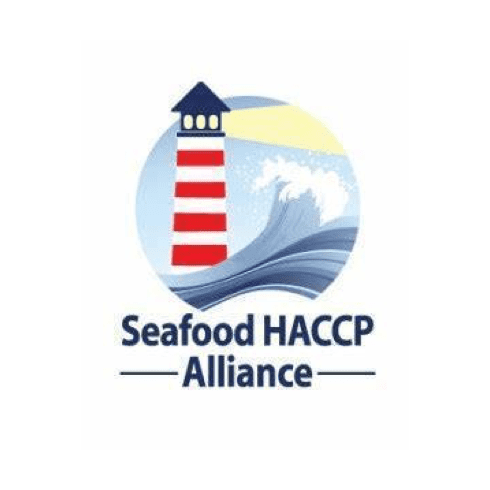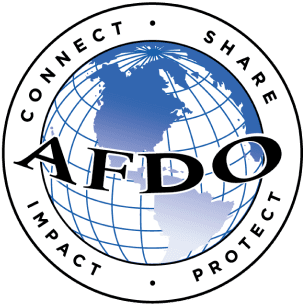
Seafood HACCP Alliance FAQ’s
Below you will find the most common inquiries on Seafood HACCP Training, materials, etc. For questions, please email haccp@afdo.org.
FDA Training Requirement
Absolutely! The Seafood HACCP Alliance training program was designed to meet the training requirements established under the U.S. Food and Drug Administration (FDA) mandatory seafood HACCP regulation (21 CFR Part 123). Section 123.10 of this regulation requires that certain HACCP activities be conducted by a “trained individual.”
A “trained individual” is one who “has successfully completed training in the application of HACCP principles to fish and fishery product processing at least equivalent to that received under a standardized curriculum recognized as adequate by the FDA or who is otherwise qualified through job experience to perform these functions.”
The FDA has recognized the Seafood HACCP Alliance training program as the standardized curriculum by which the agency will evaluate training courses to determine if they meet the requirements of this regulation.
The following activities must be conducted by a “trained individual”:
- Developing a HACCP plan that is appropriate for a specific processor in order to meet the requirements of Sec. 123.6(b);
- Reassessing and modifying the HACCP plan in accordance with the corrective action procedures specified in Sec. 123.7(c)(5), the verification activities specified in Sec. 123.8(a)(1), and the hazard analysis in accordance with the verification activities specified in Sec. 123.8(c); and
- Performing the record review required by Sec. 123.8(a)(3);
An electronic copy of 21 CFR Part 123 can be found at https://www.ecfr.gov/current/title-21/chapter-I/subchapter-B/part-123
Certificates
There is no such thing as being “Seafood HACCP Certified;” however, individuals can be “HACCP Trained.” If an organization has a “HACCP Trained Individual,” they can advertise that they operate under a “HACCP System” or a “HACCP Program.”
The AFDO/SHA Seafood HACCP certificates do not have an expiration date; however, we encourage you to take courses as refreshers over the years to maintain knowledge and stay updated with any guidance changes/updates. We also recommend checking with your company (or whoever is requesting a copy of your certificate) to see if they require recertification after a certain period.
Yes, replacement certificates are $15 USD. To request and pay for a replacement certificate, please navigate to: https://afdo.org/training/replacement-certificate/
Students
To become an AFDO/SHA qualified trainer, applicants must have completed the Seafood HACCP Alliance’s Basic Seafood HACCP course, the SHA Internet course (Segment One) plus a Segment Two course, or a HACCP course provided by the U.S. Department of Commerce/NOAA-Seafood Inspection Program since 2011 (the last major update to the Guidance) in advance of the Trainer Course to ensure they are familiar with the required SHA training materials, regulations, and concepts.
To submit an application or join the course waitlist, visit: https://afdo.org/training/sha/seafood-haccp-instructor/seafood-haccp-train-the-trainer-course/
No, there are no refresher courses available. We recommend using your current Segment Two course completion certificate as an “entry ticket” to take another Segment Two course as a refresher. There is no need to retake Segment One unless you would like to.
For Segment One, please visit: https://seafoodhaccp.cornell.edu/registration/
For Segment Two, Basic HACCP, or Sanitation Control Procedures (SCP), please visit: https://afdo.org/training/sha/seafood-haccp/upcoming-sha-courses/
Yes, there is a Qualified Trainer Directory. Please visit: https://afdo.org/seafood-haccp-trainers-directory-cs/
Reach out to haccp@afdo.org for trainer recommendations.
The cost of each course is listed on the course schedule. Please reach out to the instructor for payment instructions.
For Segment One, please use the following link to register and pay the $75 USD course fee: https://seafoodhaccp.cornell.edu/registration/
Upon completion of registration, registration forms and payment receipts are automatically sent to the course mailbox at seafoodhaccp@cornell.edu. The course administrators must then manually enroll the registrations in the Seafood HACCP Segment One course. An email will be sent to the address provided on the registration form with instructions for accessing the Seafood HACCP Segment One Internet training course. The email will contain instructions describing how to create an account and log in to this course through the Canvas system. This is a manual process that must be conducted by a course manager during business hours (9:00 a.m. to 4:00 p.m. Eastern Time) Monday through Friday.
No, you will receive a Course Completion Notice email from seafoodhaccp@cornell.edu at the conclusion of Segment One. This email will act as your “entry ticket” to Segment Two.
If you did not receive a Course Completion Notice email at the conclusion of Segment One, please reach out to seafoodhaccp@cornell.edu.
You MUST take Segment Two within 9 months of completing Segment One. Once you complete Segment Two, you will receive a Course Completion Certificate.
Unfortunately, the only acceptable certificates in lieu of a Segment One CCN email are the U.S. Department of Commerce/NOAA-Seafood Inspection Program Certificate or the SHA/AFDO Seafood HACCP certificate. Based on the continuing collaboration with USDC since the conception of the SHA, the concurrent USDC/NOAA Basic HACCP courses are considered equivalent to the required SHA/AFDO basic HACCP course, including the use of similar training manuals, models, and practical exercises. NOAA SIP is no longer providing external HACCP training.
We have 4 different course types.
Segment One (online, self-paced, 12 Modules)
The internet course consists of 12 modules that explain seafood safety hazards, pre-requisite programs, the 7 principles of HACCP, the FDA Seafood HACCP regulation, and the FDA Guidance materials available to help develop a HACCP plan.
- Via Cornell University
- At completion of the course, students must receive a Course Completion Notice email from Cornell University to act as an “entry ticket” for a Segment Two course; this CCN email must be submitted to the Segment Two Instructor during enrollment. Students must take Segment Two within 6-9 months of receiving their CCN email from Cornell University.
- Students will receive a Basic HACCP certificate at the conclusion of Segment Two.
Segment Two (instructor-led, either online or in-person, 6.5 Contact Hours)
In Segment Two, students will review the 7 principles of HACCP, the FDA seafood HACCP regulation, and the FDA Hazards Guide. Students will also work in groups to conduct a Hazard Analysis and develop a HACCP plan for a model seafood business.
- Offered by various instructors.
- Price varies by instructor.
- Students will receive a Basic HACCP certificate at the conclusion of this course.
Basic HACCP (combination of Segment One & Segment Two: in-person 16 Contact Hours or virtual 16.5 Contact Hours)
The Basic Seafood HACCP training course teaches the principles of HACCP and empowers processors to develop HACCP plans specific to each seafood product they handle or produce.
- Offered by various instructors.
- Price varies by instructor.
- Students will receive a Basic HACCP certificate at the conclusion of this course.
SCP (instructor-led, either online or in-person, 6.5 Contact Hours)
The Sanitation Control Procedures (SCP) course teaches participants about proper sanitation methods, preventing cross-contamination, proper handling of toxic compounds, protecting food from adulterants and pests, how to handle employee health issues, and proper hand- washing techniques.
- Offered by various instructors.
- Price varies by instructor.
The Aquaculture course is coming soon.
The proposed aquaculture course will act as an Add-on to the 1-day Segment Two course and will be optional but very beneficial for aquaculture processors and importers. The course will provide more detailed information on specific aquaculture topics that a processor or importer may need to know to control hazards associated with aquaculture fish and fishery products effectively. The participants will learn the fundamental differences between processing aquaculture versus wild-caught fish as well as the intricacies of the control strategies associated with aquaculture production.
- Planned Course Time: 6-8 hours
- In-person or Virtual
Miscellaneous
Based on the question, this appears to be a food establishment and would not be subject to the HACCP regulation; however, we recommend that you check in with your local food safety regulators for any certification requirements that may be necessary for your facility. AFDO has a Directory of State and Local Officials. This may aid in locating your local food safety regulator: https://afdo.org/directories/dslo/
Wholesale seafood operations need a HACCP “Trained Individual” if they handle fish or fishery products. Your business meets the definition of a “processor” in 21 CFR Part 123, so yes, you will need a qualified person on staff who can develop a HACCP plan, reassess and modify the HACCP plan, and perform record review.
The FDA published “HACCP Regulation for Fish and Fishery Products: Questions and Answers” to provide answers to commonly asked questions: https://www.fda.gov/regulatory-information/search-fda-guidance-documents/guidance-industry-questions-and-answers-haccp-regulation-fish-and-fishery-products
You can also email SeafoodHACCP@fda.gov with any questions.
Information about the Seafood List can be found here: https://www.fda.gov/regulatory-information/search-fda-guidance-documents/guidance-industry-seafood-list
To access the Seafood List, click here: https://www.cfsanappsexternal.fda.gov/scripts/fdcc/?set=SeafoodList
Yes, FDA has a Seafood HACCP Video Series that is designed to help the seafood industry and federal and state regulators better understand the specific concepts described in FDA’s Fish and Fishery Products Hazards and Controls Guidance. There is also an introductory video to the Guide: https://www.fda.gov/food/seafood-guidance-documents-regulatory-information/fish-and-fishery-products-hazards-and-controls#videos
The most current versions of all manuals are available for free download on the University of Florida’s Sea Grant website and are also available for purchase from the University of Florida’s IFAS Extension Bookstore. At this time, the manuals are only offered in English and Spanish.
